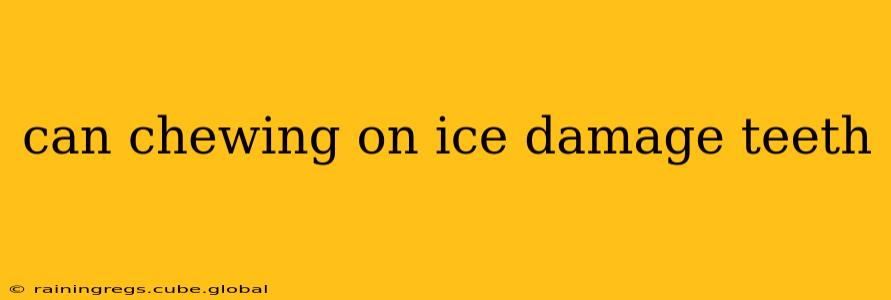Many people enjoy the refreshing crunch of ice, but is this habit damaging your teeth? The short answer is: yes, chewing ice can significantly damage your teeth. While the occasional accidental chip isn't a major concern, regularly chewing ice puts your pearly whites at considerable risk. This article will explore the potential damage, preventative measures, and what to do if you've already experienced damage.
How Does Chewing Ice Damage Teeth?
Ice is incredibly hard, much harder than your tooth enamel. When you chew on ice, the force exerted can cause several types of damage:
-
Fractures and Cracks: The most common damage is the fracturing or cracking of teeth. These cracks can be microscopic, initially causing no pain, but they can worsen over time, leading to sensitivity, pain, and potentially requiring extensive dental work.
-
Enamel Wear: The constant abrasion from chewing ice wears down your tooth enamel, the hard outer layer protecting your teeth. This enamel erosion makes your teeth more susceptible to cavities, sensitivity, and discoloration.
-
Broken Fillings or Crowns: If you have existing dental work like fillings or crowns, the force of chewing ice can dislodge or damage them, necessitating further dental intervention.
-
Gum Damage: The force of chewing ice can also traumatize the gums, potentially leading to gum recession and exposing the more sensitive root surfaces of your teeth.
What are the Signs of Ice-Related Tooth Damage?
Recognizing the signs of ice-related tooth damage early is crucial for preventing further complications. Look out for these symptoms:
- Increased Tooth Sensitivity: Experiencing pain or discomfort when consuming hot, cold, sweet, or acidic foods and drinks.
- Sharp Pain While Chewing: A sudden, sharp pain when biting down on something, even without ice.
- Visible Cracks or Chips: Noticeable chips or cracks in your teeth, which may be accompanied by discoloration.
- Loose Fillings or Crowns: If you have fillings or crowns, check for any looseness or damage.
Can I Still Enjoy Iced Drinks?
Absolutely! You don't have to forgo all iced beverages. The key is to avoid chewing the ice. Use a straw to sip your iced drinks, allowing the ice to melt naturally. This way, you can still enjoy the refreshing coolness without the risk of dental damage.
What Should I Do If I've Damaged My Teeth From Chewing Ice?
If you suspect you've damaged your teeth from chewing ice, it's essential to see a dentist immediately. Early intervention is key to preventing further complications and minimizing the extent of the necessary repairs. Your dentist can assess the damage, diagnose the problem accurately and create a treatment plan that addresses the specific issues.
How Can I Stop Chewing Ice?
Breaking a habit can be challenging, but here are some tips:
- Identify Your Triggers: What situations or emotions lead you to chew on ice? Understanding your triggers can help you find healthier coping mechanisms.
- Find Alternatives: Keep healthy, refreshing snacks on hand, such as fruits, vegetables, or sugar-free gum.
- Mindfulness: Pay attention to when you're chewing ice. Bring awareness to the habit and consciously choose to stop.
- Gradual Reduction: Instead of abruptly quitting, try reducing your ice-chewing gradually.
Are There Any Long-Term Effects of Chewing Ice?
The long-term effects of chewing ice can be quite significant, potentially leading to extensive dental work, including fillings, crowns, root canals, or even tooth extractions. Consistent enamel wear can also increase your susceptibility to cavities and gum disease, requiring ongoing and potentially costly treatment.
How Can I Protect My Teeth From Damage?
Besides avoiding chewing ice, here are some general tips for protecting your teeth:
- Regular Dental Checkups: Visit your dentist regularly for checkups and cleanings to catch any problems early.
- Proper Oral Hygiene: Maintain good oral hygiene practices, including brushing twice daily and flossing once daily.
- Healthy Diet: Consume a balanced diet low in sugary and acidic foods and drinks.
By understanding the potential consequences and taking preventative measures, you can protect your teeth from the damaging effects of ice chewing and maintain a healthy, beautiful smile. Remember, a healthy smile is an investment worth protecting.
